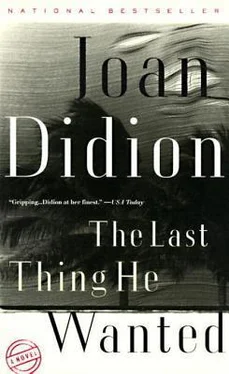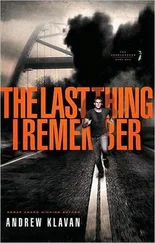Tactical erdlators have been my mountain and forest lines.
This business of Elena McMahon, then, is hard for me.
This business of what “changed” her, what “motivated” her, what made her do it.
I see her standing in the dry grass off the runway, her arms bare, her sunglasses pushed up into her loose hair, her black silk shift wrinkled from the flight, and wonder what made her think a black silk shift bought off a sale rack at Bergdorf Goodman during the New York primary was the appropriate thing to wear on an unscheduled cargo flight at one-thirty in the morning out of Fort Lauderdale-Hollywood International Airport, destination San José Costa Rica but not quite.
Her sunglasses are pushed up but her eyes are shut tight.
A dog (underfed, mangy, of no remarkable size) is bursting from the open door of a concrete structure off the apron and racing toward her.
The man beside her, his head shaved, cutoff jeans slung below his navel, is singing the theme from Bonanza as he crouches and beckons to the dog.
We got a right to pick a little fight—
Bo-nan-za—
If anyone fights with any one of us—
He’s got a fight with me—
Her eyes remain shut.
On second thought I am not sure what would be, in this context, “appropriate.”
Possibly the baseball cap lent her by one of the refueling crew. The cap was lettered NBC SPORTS, its familiar peacock logo smeared with diesel fuel.
“Actually I think somebody was supposed to meet me,” she said to the pilot when the man with the shaved head had disappeared and the last pallet been unloaded and the refueling completed. Over the past dozen hours she had come to see the pilot as her partner, her backup, her protection, her single link to the day before.
“Looks like somebody didn’t give you the full skinny,” the pilot said.
Smell of jasmine, pool of blue jacaranda.
Coincidentally, although not really, since it was in the role of mother that I first knew Elena, Catherine Janklow was also in that eighth-grade class at the Westlake School for Girls in Los Angeles. Elena’s performance as a Westlake Mom (so we were called in school bulletins) was so attentive to detail as to be impenetrable. She organized benefits for the scholarship fund, opened her house for picnics and ditch days and sleepovers, got up every Friday at four hours before dawn to deliver the Astronomy Club to remote star-watching locations in Lancaster or Latigo Canyon or the Santa Susana Mountains, and was duly repaid by the attendance of three eighth graders at her Westlake Career Day workshop on “Getting Started as a Reporter.”
“You’re at an age right now when it’s impossible even to imagine how much your life is going to change,” Elena told the three eighth graders who turned up for her Career Day workshop.
Two of the eighth graders maintained expressions of polite disbelief.
The third jabbed a finger into the air, then crossed her arms truculently across her chest.
Elena looked at the child. Her name was Melissa Simon. She was Mort Simon’s daughter. Mort Simon was someone Wynn knew who had improved the year by taking a motion picture studio private and spinning off its real assets into various of his personal companies.
“Melissa.”
“Excuse me,” Melissa Simon said. “But I don’t quite see why my life is supposed to change.”
There had been a silence.
“That’s an interesting point,” Elena had said then.
Catherine had not attended her mother’s workshop on Getting Started as a Reporter. Catherine had signed up for a workshop conducted by a Westlake Mom who happened to be a business affairs lawyer at Paramount (“Motion Picture Development — Where Do You Fit In?”), then skipped it to finish her own eighth-grade autobiographical essay on the event or individual or experience that had “most changed” her life. “What is definitely most changing my life this semester is my mother getting cancer,” Catherine’s autobiographical essay began, and continued for two neatly typed double-spaced pages. Catherine’s mother, according to Catherine, was that semester “too tired to do anything normal” because every morning after dropping the car pool at school she had been going to UCLA for what Catherine knowledgeably described as “radiation zapping following the exsishun [ sic ] of a stage 1 good prognose [ sic ] breast lesion.” That this was not a fact generally known does not, to me, suggest “motivation.”
Treat Morrison knew it, because he recognized the scar.
Diane had had the same scar.
Look, he said when Elena fell silent. What difference does it make. You get it one way or you get it another, nobody comes through free.
She sat on the dry grass in her black silk shift and the cap lettered NBC SPORTS and watched the L-100 taxi out for takeoff and tried to think what to do next. The cargo had been loaded onto flatbed trucks. Whoever was supposed to make the payment had not appeared. She had thought at first that the man with the shaved head and the cutoff jeans was her contact but he was not. He was, he said, on his way home to Tulsa from Angola. He was, he said, just lending a little expertise while he was in this particular area.
She had not asked him how this particular area could reasonably be construed as on the way to Tulsa from Angola.
She had not asked him what expertise he was lending.
During the ten minutes she had spent trying to talk the pilot into waiting for her contact the flatbed trucks had been driven away.
She was going to need to rethink this step by step.
She was going to need to reconnoiter, reassess.
The L-100 and the zone of safety it represented were about to vanish into the cloud cover.
Fly it down, fly it back, the pilot had said. That’s my contract. I get paid to drive the bus. I get paid to drive the bus when the engines are overheating. I get paid to drive the bus when the loran goes down. I don’t get paid to take care of the passengers.
Her partner, her backup, her protection.
Her single link to the day before.
He had flown it down and now he was flying it back.
Per his contract.
She did not think it possible that her father would find himself in exactly this situation, yet she had done exactly what he said he had to do. She had done exactly what her father said he had to do and she had done exactly what Barry Sedlow said to do.
Just do it my way for a change.
This would very soon be all right.
She would very soon know what to do.
She felt alert, a little light-headed. She did not yet know where she was, and the clearing in which the strip had been laid down had suddenly cleared of people, but she was ready, open to information.
This should be Costa Rica.
If this was Costa Rica the first thing she needed to do was get to San José.
She did not know what she would do if she did get to San José but there would be a hotel, offices of American banks, an airport with scheduled carriers.
Through the open door of the concrete structure off the apron she could see, intermittently, someone moving, someone walking around, a man, a man with a ponytail, a man with a ponytail wearing fatigues. She kept her eyes on this door and tried to recall lessons learned in other venues, other vocations. One thing she had learned during her four-year sojourn at the Herald Examiner was how easy it was to get into places where no one was supposed to be. The trick was to attach oneself to service personnel, people who had no particular investment in who got in and who stayed out. She had on one occasion followed a telephone crew into a locked hangar in which an experimental stealth bomber was being readied for its first rollout. She had on more than one occasion gotten inside a house where someone did not want to talk to her by striking up conversation with the pool man, the gardener, the dog groomer who had run a cord inside the kitchen door to plug in a dryer.
Читать дальше












